The article delineates ten strategies for effective branding that can propel hotel success, emphasizing:
Each strategy is bolstered by data-driven insights and industry trends, underscoring the imperative for hotels to embrace comprehensive marketing approaches. This adoption is crucial for enhancing visibility, engaging guests, and ultimately driving revenue growth.
As the hospitality industry evolves, the significance of effective branding strategies becomes increasingly apparent, especially as hotels prepare for the challenges and opportunities of 2025. This article delves into ten essential strategies designed to empower accommodations to enhance their visibility and foster lasting relationships with guests. However, with the digital landscape constantly shifting, how can hotels ensure they stand out amidst fierce competition and rapidly changing consumer preferences? Exploring these strategies reveals actionable insights that can drive success and elevate hotel branding in an ever-competitive market.
Lights On offers a comprehensive suite of digital promotional solutions tailored specifically for the hospitality sector. This includes website and content management, performance promotion, social media oversight, search engine optimization, and website design. By leveraging data-driven insights, Lights On empowers accommodations to refine their promotional strategies, which enhances their branding hotel and leads to substantial revenue growth.
As we approach 2025, the importance of effective online promotion cannot be overstated. Accommodations must engage prospective guests at every stage of their journey—from initial awareness to reservation and retention. Notably, 49% of marketers regard organic search as the most effective channel for driving website traffic, underscoring the critical role of SEO in hospitality marketing strategies. Additionally, 86% of industry professionals recognize improved visibility as a significant advantage of social media promotion, highlighting its essential role in cultivating customer relationships.
The is projected to expand to $472.5 billion by 2025, presenting increasing opportunities for hotels to adapt their marketing approaches. Furthermore, managing reputation and online reviews has become crucial for attracting potential guests, as travelers increasingly depend on platforms like TripAdvisor and Google Reviews. In tandem with these marketing strategies, Lights On provides temporary revenue management solutions, ensuring continuous improvement during staffing transitions. By harnessing customer data for personalized experiences, accommodations can meet the evolving demands of travelers, positioning themselves for success in a competitive marketplace.

Applying efficient SEO techniques is vital for accommodations aiming to enhance their online presence and attract more visitors. Key practices include:
Local SEO is particularly crucial; can lead to a 50% increase in customer engagement, and businesses with complete profiles receive 50% more customers than those with incomplete profiles. Encouraging guest reviews significantly enhances credibility, as 71% of consumers read online reviews before visiting a local business, and 88% of consumers trust these reviews as much as personal recommendations.
Furthermore, to elevate your SEO efforts, consider implementing actionable tips:
By concentrating on these strategies, branding hotels can enhance their visibility in search results, ultimately resulting in more direct reservations and a stronger competitive advantage in the hospitality sector. Given that 80% of local searches convert into clients, the necessity for accommodations to adopt effective SEO strategies is unmistakable.
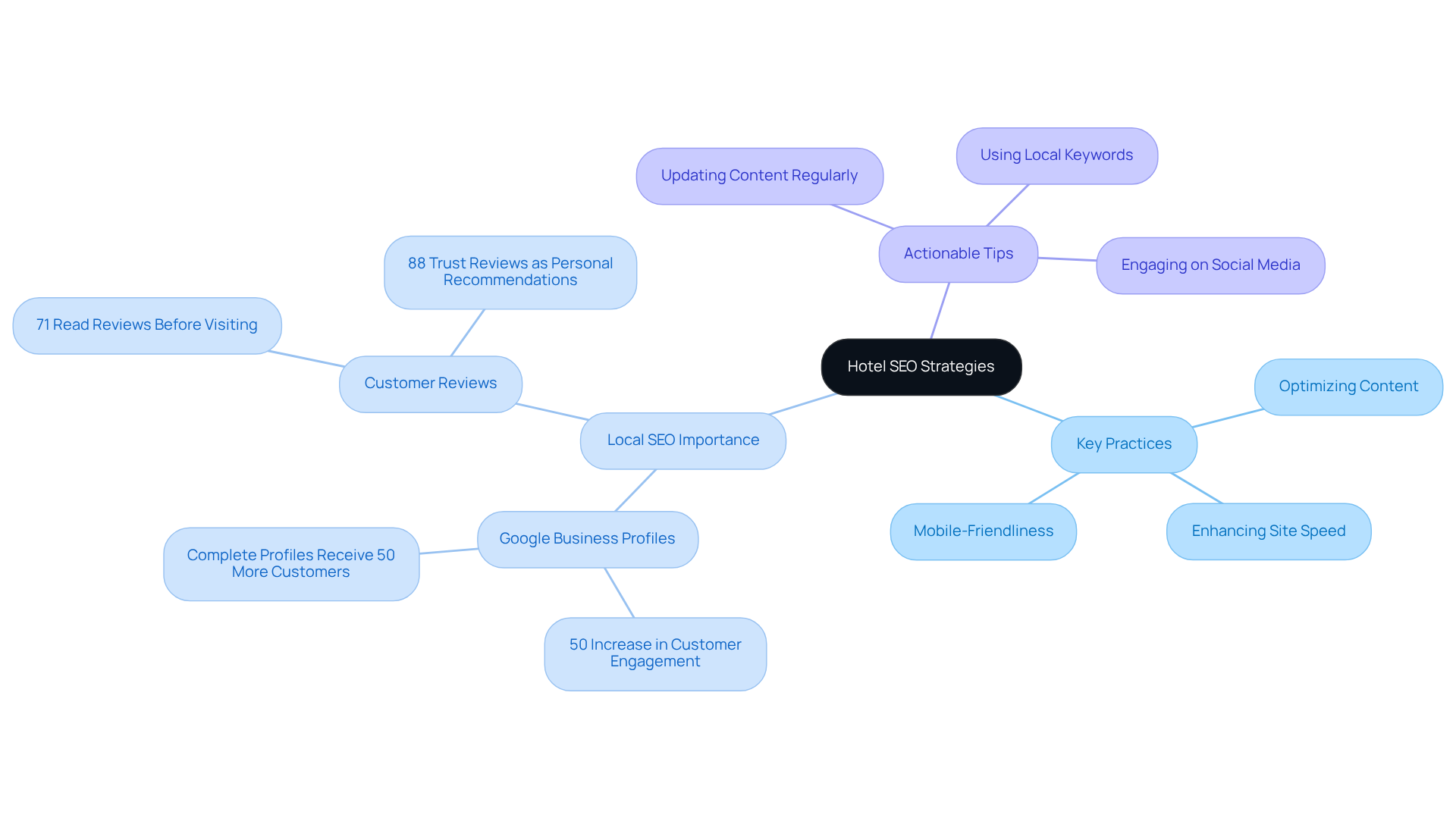
Social media management is essential for accommodations aiming to cultivate and actively engage with their audience. By developing compelling content that showcases unique offerings, local attractions, and unforgettable guest experiences, accommodations can establish a robust online presence. Engaging with followers through comments and direct messages fosters a sense of community, which not only encourages repeat visits but also enhances customer loyalty.
Platforms such as Instagram and Facebook prove particularly effective, as they enable accommodations to reach a wider audience and promote direct reservations. In 2025, the influence of social media on lodging brand loyalty is more pronounced than ever, with successful campaigns illustrating the power of genuine engagement. For instance, accommodations that leverage user-generated content and interactive posts can significantly boost their visibility and connection with potential guests.
As Patrick Landman, a hospitality promotion specialist, notes, a strategic approach to social media outreach empowers establishments to enhance visibility, engagement, and reservations. Additionally, statistics reveal that 11.53% of hoteliers find Instagram highly effective for promotional activities, underscoring its efficiency. By prioritizing social media management, accommodations can effectively cultivate brand loyalty and secure long-term success.

Performance marketing serves as a powerful tool for accommodations aiming to optimize their advertising spend and increase reservations. By leveraging data analysis, accommodations can meticulously track campaign performance and refine their strategies in real time.
Prioritizing high-performing channels, particularly pay-per-click (PPC) advertising and retargeting campaigns, can significantly enhance brand visibility and drive conversions. For example, businesses typically generate an average of $8 for every $1.60 spent on Google Ads, highlighting the substantial return on investment achievable through effective PPC strategies. Furthermore, search ads can elevate brand awareness by approximately 80%, underscoring the critical role of PPC in boosting visibility.
Regularly reviewing campaign data empowers accommodations to make informed decisions, enhancing overall marketing effectiveness and ensuring that advertising budgets are utilized efficiently. As marketing expert Gary Vaynerchuk asserts, successful marketing revolves around telling compelling stories that resonate with audiences. Therefore, accommodations should align their advertising initiatives with consumer interests and behaviors.
To , accommodation providers ought to implement regular evaluations of their PPC campaigns to pinpoint areas for improvement and leverage high-performing ads, ultimately driving bookings and optimizing revenue management.
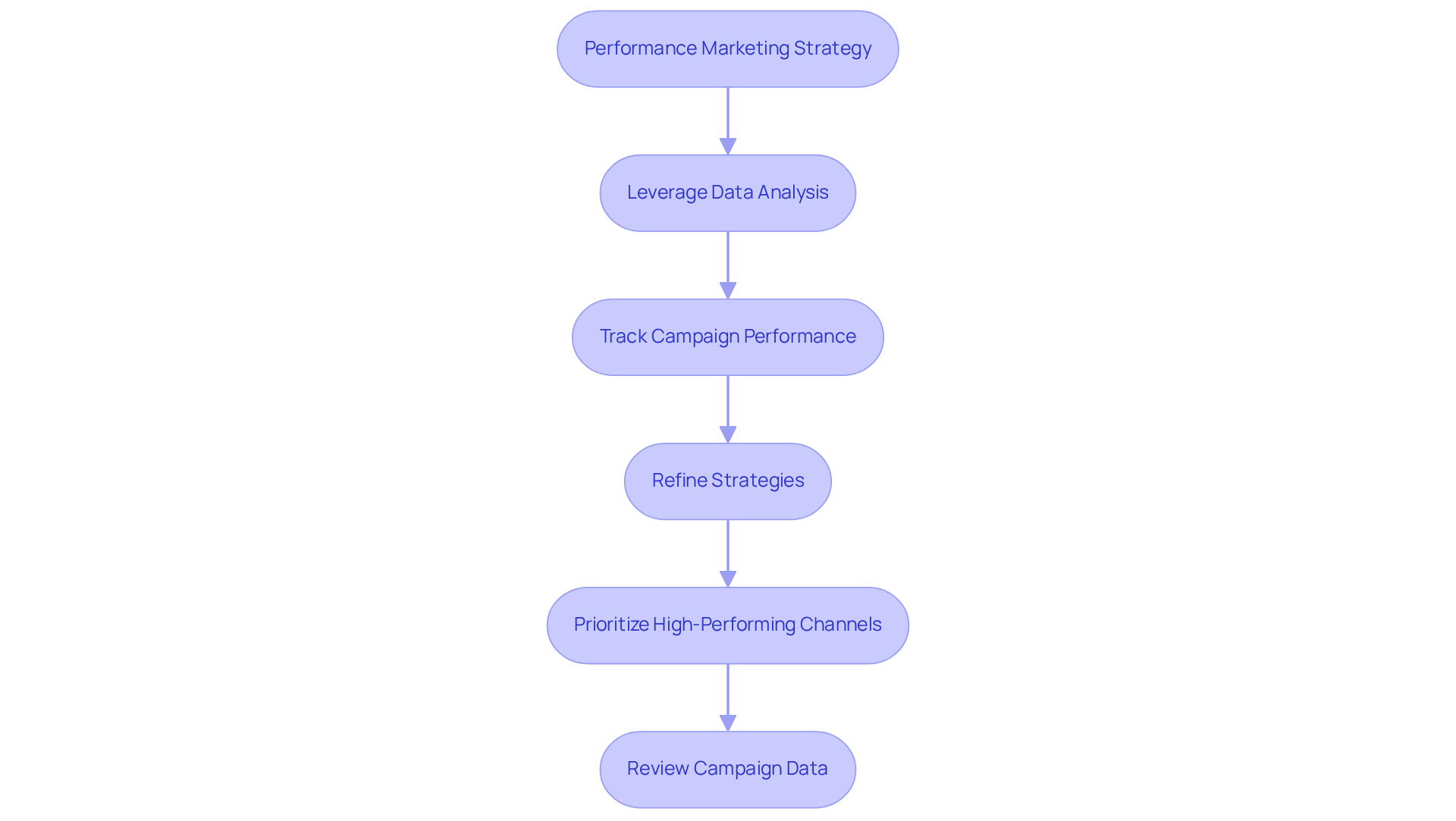
Email promotion serves as a vital instrument for branding hotels that aim to cultivate lasting connections with visitors and boost repeat reservations. By strategically segmenting their email lists, accommodations can deliver personalized content that resonates with individual preferences, thus contributing to their branding hotel through tailored promotions and updates that significantly enhance visitor engagement.
Regular newsletters that highlight local activities, special offers, and property updates play a crucial role in branding hotel, ensuring that the accommodation remains top-of-mind for previous visitors and increasing the likelihood of return visits.
Furthermore, automation tools are essential in this strategy, facilitating timely and relevant communication that aligns with visitors' interests and behaviors.
Looking ahead to 2025, the impact of customized email campaigns is expected to grow even more pronounced, as data-driven insights empower accommodations to craft messages that not only capture attention but also inspire action, ultimately leading to higher booking rates and increased customer loyalty.
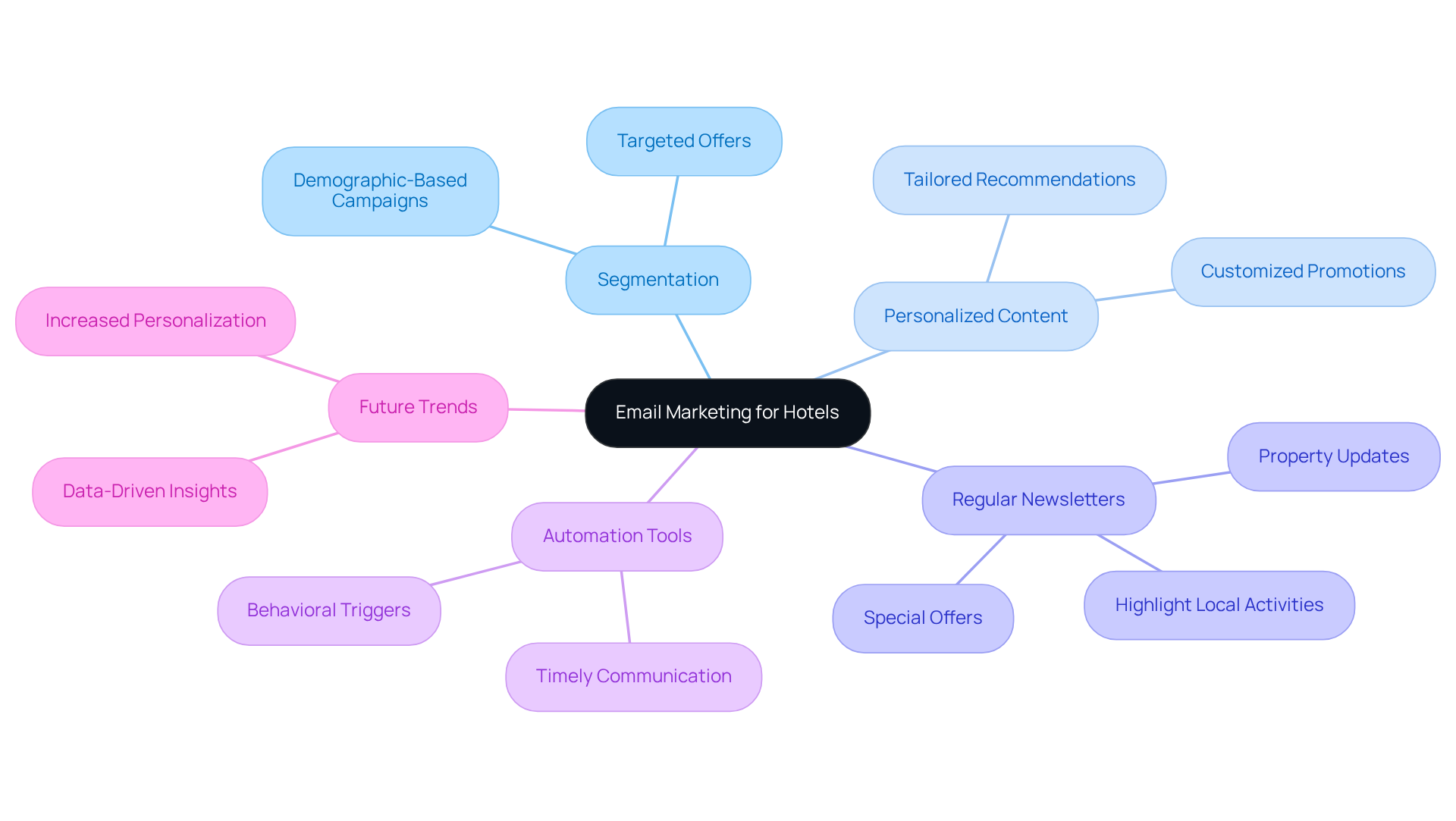
Website design is pivotal in crafting memorable for prospective visitors. A well-designed website must not only be visually appealing but also easy to navigate and optimized for mobile devices. Key elements encompass:
By prioritizing user experience, accommodations can significantly enhance visitor satisfaction and drive conversion rates. Furthermore, consider how the design of your website reflects your branding, hotel identity, and values, as this can further entice potential guests to engage with your offerings.
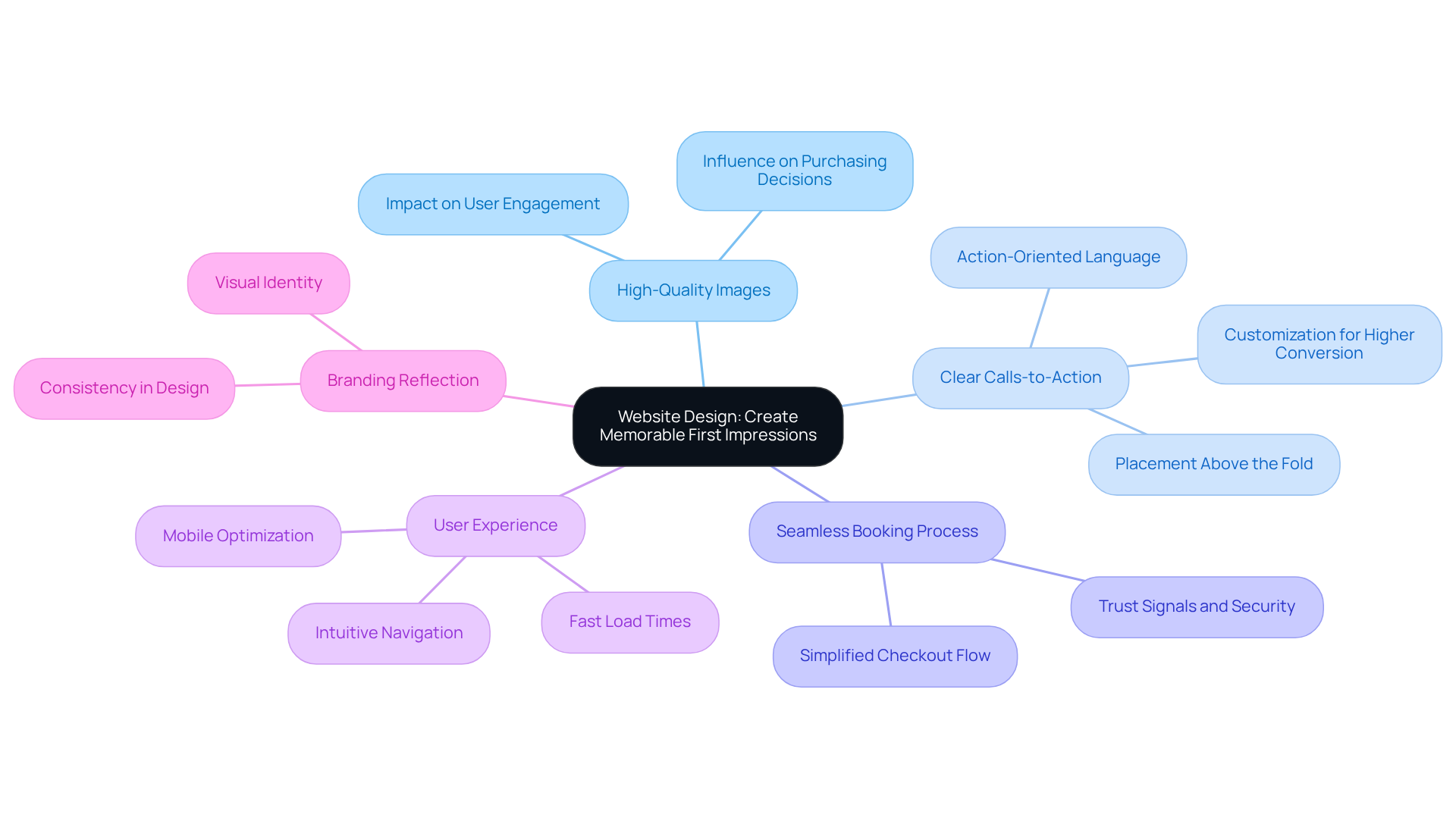
Pricing optimization is essential for branding hotel establishments that aim to maximize revenue without compromising brand integrity. This process entails a comprehensive examination of market trends, , and consumer demand to establish competitive rates. By applying flexible pricing methods, accommodations can modify their rates instantaneously, seizing optimal income during times of high demand while remaining attractive during low-demand periods. For instance, accommodations can raise prices when occupancy levels are elevated and decrease them when demand diminishes, thereby maximizing average visitor expenditure and improving occupancy levels throughout the year. Consistently evaluating and enhancing pricing approaches is crucial for remaining competitive in a swiftly changing market.
To efficiently promote these pricing methods, accommodations can utilize digital advertising strategies, such as targeted online ads and social media promotions, to convey value to potential guests. As noted by industry experts, effective dynamic pricing can lead to revenue increases of 1-8% for businesses that implement it successfully, underscoring its significance in driving profitability within the hospitality sector. Furthermore, combining pricing optimization with branding hotel strategies can enhance visibility and attract more reservations, ensuring that accommodations stay competitive. However, it is important to consider challenges such as potential customer frustration due to constantly changing prices.
Moreover, monitoring competitors is crucial for determining optimal price points, as approximately 30% of UK and European businesses have adopted dynamic pricing models, highlighting its growing importance in the industry. AI-driven dynamic pricing strategies can increase profitability by up to 22%, showcasing the technological advancements that can enhance revenue management in the hospitality sector.

Demand generation is paramount for establishments aiming to attract new visitors and maximize occupancy levels. This objective can be effectively achieved through targeted promotional campaigns that resonate with potential guests. Collaborating with local businesses fosters mutually beneficial partnerships, enhancing visibility and appeal. Furthermore, participation in travel expos allows accommodations to showcase their unique offerings directly to interested travelers.
Utilizing social media and content strategies is essential for highlighting distinctive experiences and promotions. By curating engaging content that reflects the branding hotel, accommodations can capture the attention of prospective guests. A robust online presence, characterized by active engagement with users, cultivates relationships that can lead to increased bookings.
Effective promotional campaigns have demonstrated significant impacts on accommodation reservations. For instance, a recent initiative by a lodging chain that leveraged influencer partnerships resulted in a remarkable surge in bookings, illustrating the effectiveness of targeted outreach. According to a study, 69% of consumers trust influencers over information coming directly from a brand, underscoring the value of such collaborations. As Maura Valentine stated, "In 2025, personalization is no longer a luxury; it’s an expectation," highlighting the necessity for . Moreover, the shift towards comprehensive demand creation is becoming essential in the hospitality sector, making it imperative for establishments to adopt branding hotel strategies to thrive in a competitive market.
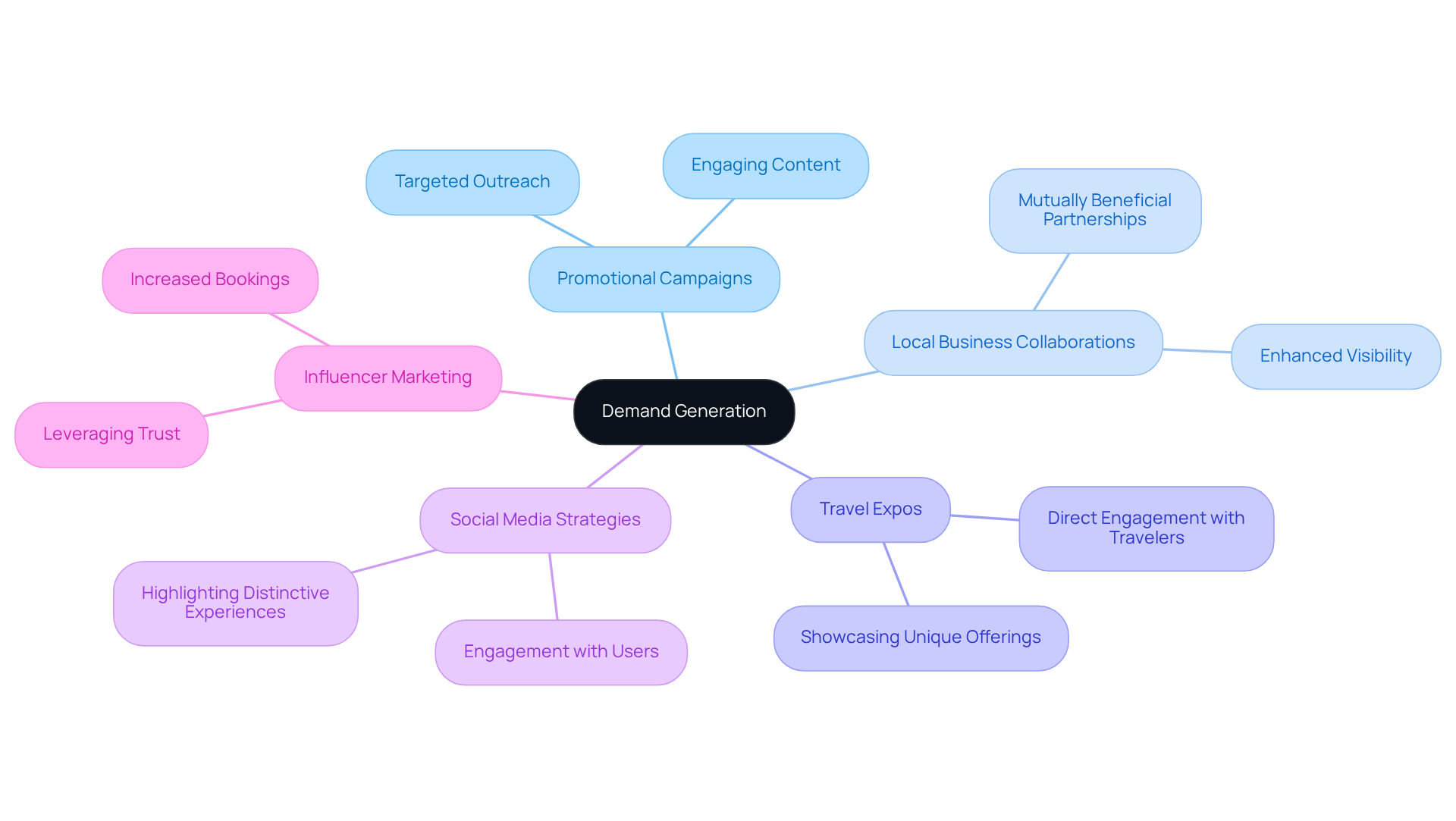
Examining market trends is essential for establishments aiming to adapt their branding strategies to the evolving landscape of consumer preferences. By consistently monitoring industry trends, gathering visitor feedback, and analyzing competitor activities, establishments can uncover valuable opportunities for enhancement and innovation. This proactive approach enables accommodations to customize their offerings and promotional messages, ensuring alignment with visitor expectations. As a result, accommodations can enhance brand loyalty and increase reservations, effectively positioning themselves within a competitive market. Industry analysts assert that comprehending consumer preferences is not merely advantageous but imperative for sustained success in the hospitality sector. To effectively capitalize on market trend analysis, hotel owners should consider the following strategies:
By addressing critical pain points such as increased visibility and effective pricing strategies, accommodations can harness market trend analysis to maintain a competitive edge.
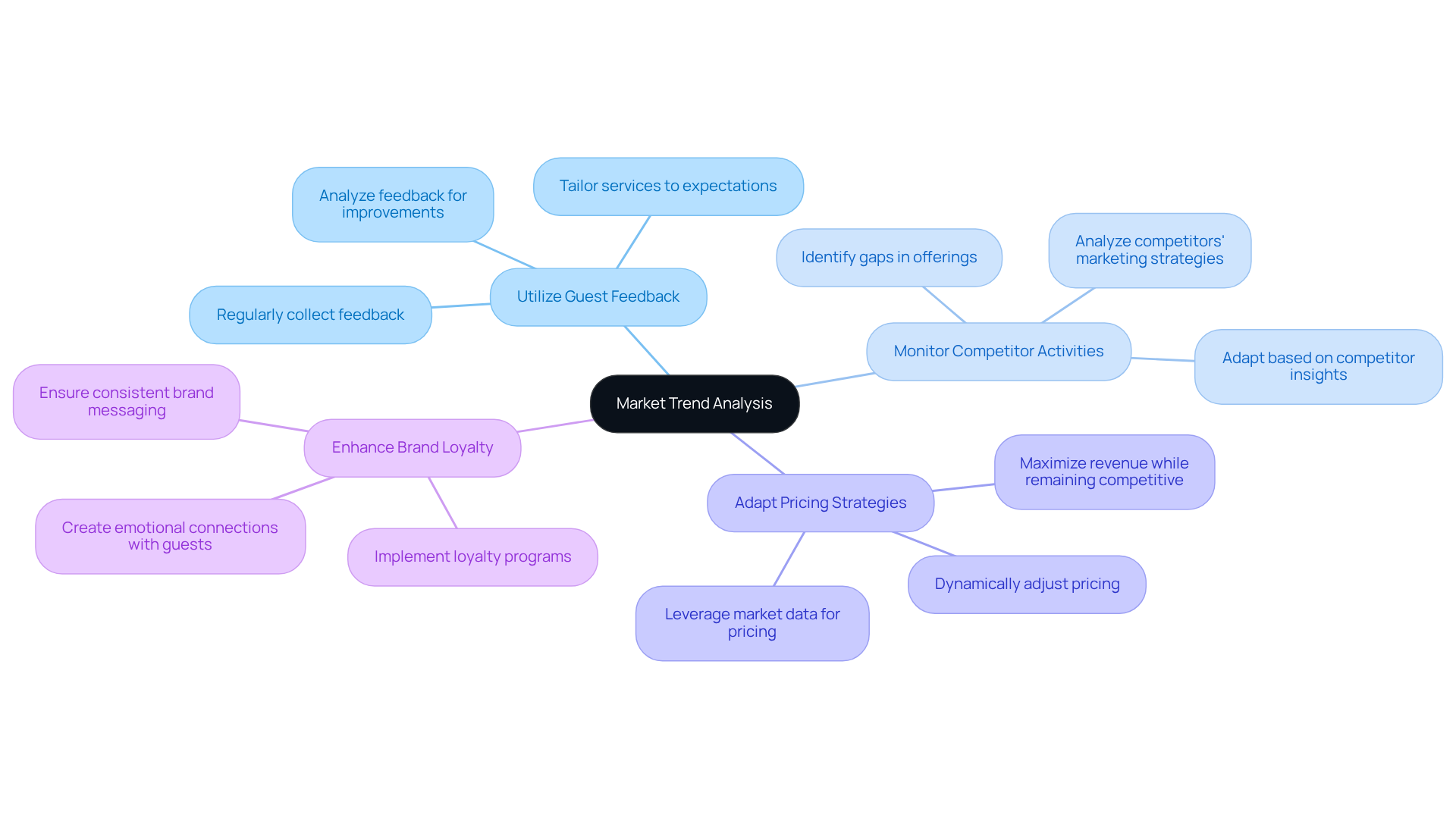
Metasearch engines are essential in boosting a property's visibility and driving reservations. By being featured on platforms like Google Hotel Ads and Trivago, accommodations can access a wider audience and compete effectively with OTAs. It is imperative for accommodations to refine their listings with accurate information, competitive pricing, and compelling visuals.
Implementing a strategic metasearch promotion plan can empower accommodations to secure more direct reservations and reduce reliance on external platforms. As Michał Głomba, CEO of Lights On, articulates, "We view them as partners, rather than contractors," underscoring the collaborative approach necessary for enhancing hospitality promotion strategies.
Moreover, Lights On has achieved notable success in this domain, realizing an average year-over-year revenue growth of 47% by leveraging to improve visibility and profitability.
Looking ahead to 2025, optimizing accommodations' listings on metasearch platforms will require a focus on user experience and data-driven insights to maintain competitiveness in a demanding market. Digital marketing experts assert that a strategic approach to metasearch can significantly elevate the branding hotel and profitability of a hotel.
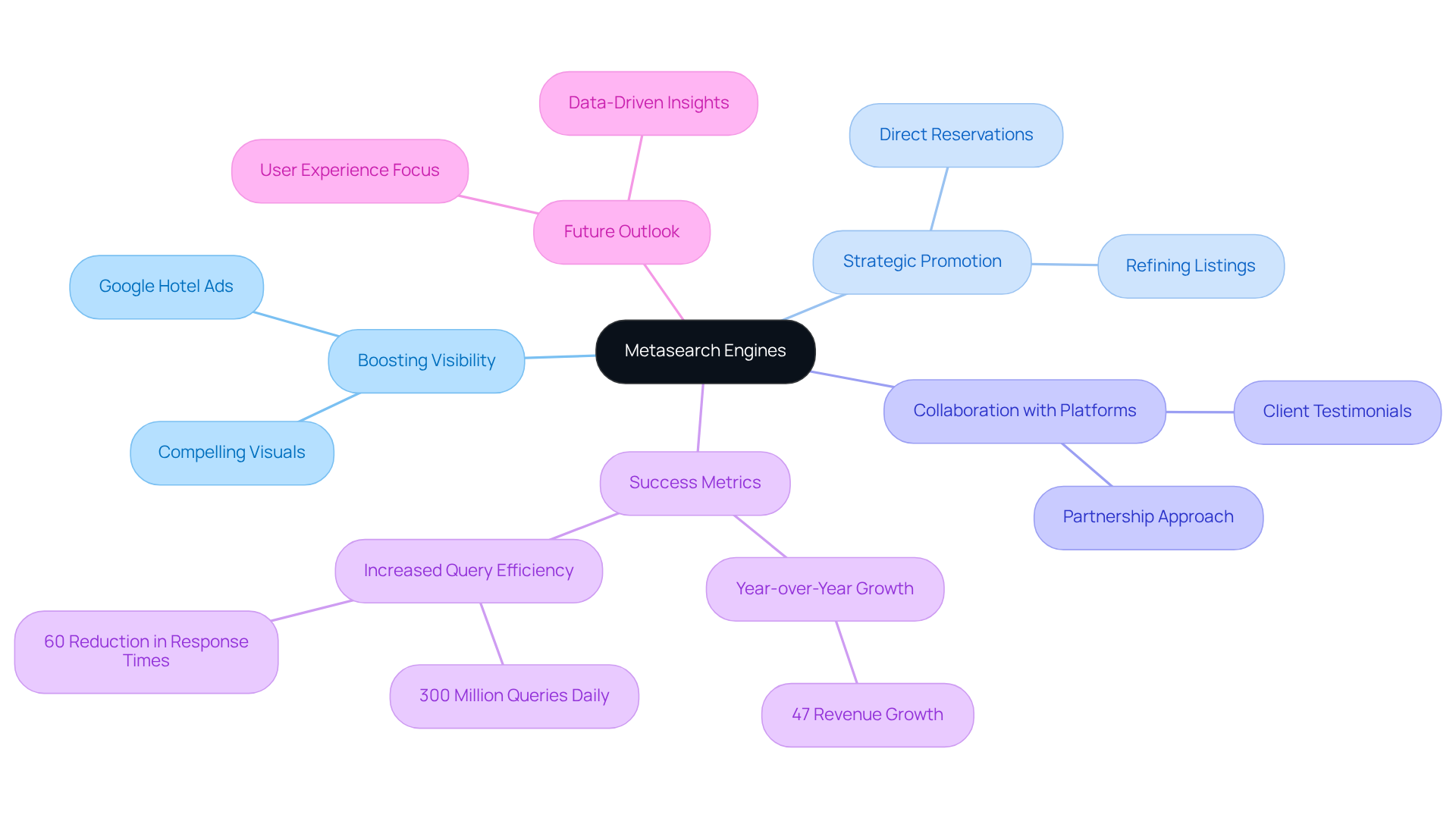
Effective branding in the hotel industry hinges on a multifaceted approach that integrates digital marketing, social media engagement, SEO strategies, and personalized guest experiences. By implementing the strategies outlined, accommodations can significantly enhance their visibility, attract new guests, and foster brand loyalty, ultimately leading to sustained success in a competitive landscape.
The article emphasizes the importance of various tactics such as:
Furthermore, understanding market trends and implementing dynamic pricing strategies are critical for adapting to evolving consumer preferences and maximizing revenue potential. Each of these elements plays a vital role in establishing a strong brand identity and ensuring long-term profitability.
As the hospitality sector continues to evolve, embracing innovative digital marketing solutions and personalized guest interactions will be essential. Hotels must recognize that effective branding is not merely about visibility but also about creating meaningful connections with guests. By prioritizing these strategies, hotel establishments can position themselves for success in 2025 and beyond, ensuring they meet the expectations of modern travelers while enhancing their overall brand value.
What digital marketing solutions does Lights On provide for hotels?
Lights On offers a comprehensive suite of digital marketing solutions tailored for the hospitality sector, including website and content management, performance promotion, social media oversight, search engine optimization (SEO), and website design.
Why is online promotion important for accommodations?
Effective online promotion is crucial as it helps engage prospective guests at every stage of their journey, leading to increased reservations and customer retention.
What role does SEO play in hospitality marketing?
SEO is vital for driving website traffic; 49% of marketers consider organic search the most effective channel. It enhances online visibility and attracts more visitors to accommodations.
How does social media promotion benefit hotels?
Social media promotion improves visibility and helps cultivate customer relationships, with 86% of industry professionals recognizing its advantages. It also fosters brand loyalty and engagement with potential guests.
What are some key SEO practices for hotels?
Key SEO practices include optimizing website content with relevant keywords, enhancing site speed, ensuring mobile-friendliness, and optimizing Google Business Profiles for local searches.
How can local SEO impact customer engagement?
Optimizing Google Business Profiles can lead to a 50% increase in customer engagement, and businesses with complete profiles receive 50% more customers than those with incomplete profiles.
What strategies can hotels implement to enhance their SEO efforts?
Hotels can enhance their SEO by regularly updating website content, utilizing local keywords in blog posts, and actively engaging with customers on social media platforms.
What is the significance of managing online reputation and reviews?
Managing reputation and online reviews is crucial as travelers increasingly rely on platforms like TripAdvisor and Google Reviews. Encouraging guest reviews enhances credibility, as 71% of consumers read them before visiting a local business.
How can social media management contribute to brand loyalty?
Social media management helps cultivate brand loyalty by developing compelling content, engaging with followers, and showcasing unique offerings and guest experiences, thus fostering a sense of community.
Which social media platforms are particularly effective for hotels?
Platforms like Instagram and Facebook are particularly effective for hotels, as they allow for wider audience reach and promote direct reservations.
What is the projected growth of the digital promotion landscape by 2025?
The digital promotion landscape is projected to expand to $472.5 billion by 2025, presenting increasing opportunities for hotels to adapt their marketing approaches.
Transform your group booking strategies with Lights On and watch your occupancy soar.